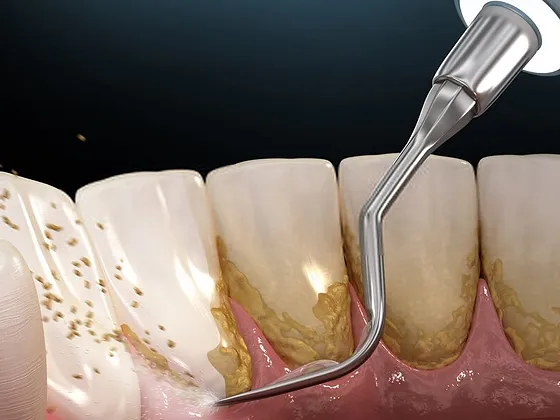

What is Ultrasonic scaling
Ultrasonic scaling is a dental cleaning technique that uses high-frequency sound waves to remove plaque, tartar, and stains from teeth. A specialized tool, the ultrasonic scaler, vibrates at ultrasonic frequencies, breaking down and dislodging hardened deposits. The scaler’s tip, along with a water spray, helps wash away debris and bacteria. This method is often preferred for its efficiency and comfort compared to traditional manual scaling. It minimizes discomfort, reduces the risk of enamel damage, and can achieve a thorough clean by reaching areas that are hard to access with manual tools. Ultrasonic scaling is a common choice for routine dental hygiene.
Symptoms Of Ultrasonic scaling
After ultrasonic scaling, some common symptoms you might experience include:
- Tooth Sensitivity : Teeth may feel more sensitive to hot or cold temperatures, especially if you have thin enamel or exposed roots.
- Gum Sensitivity : Gums might be slightly tender or swollen, and you may notice some minor bleeding, particularly if you have gum disease.
- Slight Discomfort : You might experience mild discomfort or a feeling of pressure during or after the procedure.
- Temporary Discoloration : There may be temporary staining or a film on the teeth, which should be removed during the polishing step.
How to Treatment
If you experience any discomfort or issues after ultrasonic scaling, here’s how to manage and treat them:
- Tooth Sensitivity :
- Use Desensitizing Toothpaste : Apply toothpaste designed for sensitive teeth to help reduce sensitivity. Avoid Extreme Temperatures: Steer clear of very hot or cold foods and drinks for a few days.
- Use a Soft-Bristled Toothbrush : This can minimize irritation to sensitive areas.
- Gum Sensitivity :
- Rinse with Warm Salt Water : This can help soothe irritated gums and reduce inflammation.
- Maintain Good Oral Hygiene : Brush gently and floss carefully to avoid further irritation.
- Avoid Hard or Crunchy Foods : Stick to softer foods while your gums heal.
- Slight Discomfort :
- Over-the-Counter Pain Relief : Take ibuprofen or acetaminophen if needed, according to the package directions.
- Apply a Cold Compress : Use a cold pack on your face to reduce any swelling or discomfort.
- Temporary Discoloration :
- Professional Polishing : If any discoloration remains, your dentist or hygienist can polish your teeth to remove it.